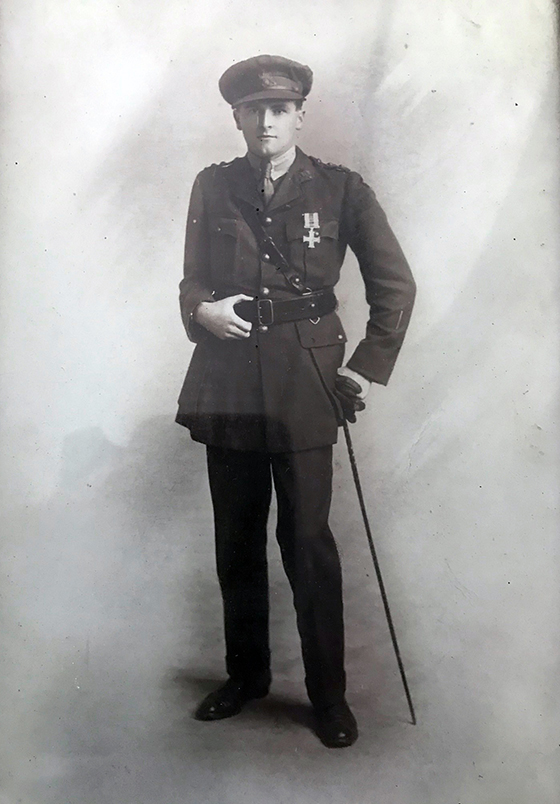J Wilson McDonald
Mercantile Rowing Club (VIC)
The following was produced for Mercantile Rowing Club’s 2020 ANZAC Day commemoration.
This year we remember WWI veteran John Wilson McDonald (known as Wilson) 8 April 1896-13 July 1961.
Geoffrey Blainey in his book “A Shorter History of Australia”, writes of the impact of WWI as follows.
Perhaps the most drastic effect of the war on Australia would never be enumerated [by soldiers lost]: it was the loss of all those talented people who would have become prime ministers and premiers, judges, divines, engineers, teachers, doctors, poets, inventors and farmers, the mayors of towns and leaders of trade unions, and the fathers of another generation of Australians. It was a war in which those with the gift of leadership, the spark of courage, and the willingness to make sacrifices often took the highest risks. A young nation could not afford to lose such men.
This year we highlight a member who survived WWI, albeit with significant injuries and humble beginnings, to become a significant member of society, and whose grandson Andrew McDonald and great-granddaughter Bridget McDonald, continued the family’s Mercantile rowing tradition. It does not prove Geoffrey Blainey wrong, but highlights his comments. The talent of those gallant leaders who survived, did go on, despite the disabilities of war, to become pillars of our society.
This ANZAC Day, we acknowledge both the those who failed to return, and also those who served. Wilson McDonald’s courageous service is recognised today.
Wilson McDonald was born in Kilmore Victoria to John and Annie McDonald. Schooled at Kilmore State School, he left at the age of 14 with his standard certificate.
He got a job at Harrisons Ramsay, importers at the age of 15 and moved to Melbourne. At the time of his enlistment at 19 years 9 months, he resided in Jolimont Terrace Jolimont. No doubt he started as an office boy or warehouseman and by the time of his enlistment had progressed to being a clerk. By the time of his retirement, he was Chairman of the local Board of the British company Harrison Crossfield.
He did not row at school and took up rowing whilst in Melbourne. As a warehouseman, he qualified to join Mercantile which drew members from the merchants and warehousemen of Melbourne, particularly from Flinders Lane. He also occupied himself by having completed 3 years as a cadet attaining the rank of second lieutenant and 2 ½ years in the citizen forces, now known as the Military Reserves, attaining the rank of lieutenant. With the written consent of his parents, he enlisted for WWI in Melbourne on 25th January 1916.
Whilst he joined as a private, his past service was quickly recognised and he was promoted to Sargeant within a week of joining. Before departure overseas, he was promoted to second lieutenant and had undertaken range finding and other training.
He departed for France in November 1916 with the 37th Battalion. Despite suffering from various ailments, no doubt caught on the journey overseas, he was promoted in the field on 17th January 1917 to Lieutenant.

The life expectancy of front-line lieutenants in WWI on the western front in France was short. Fortunately, Wilson McDonald survived, but only after being seriously wounded and thereafter being unfit for duty. On 10th October 1917, he received gunshot wounds to the right shoulder, right knee and right buttock. The shoulder injury caused him life-long issues and requiring him to change from being a right-handed person to left and left him with limited movement to the right-hand side of his body.
Clearly it also brought his rowing days to an end.
Prior to this unfortunate incident, Wilson McDonald proved himself an excellent soldier being awarded the Military Cross in the field by order dated 13th April 1917. The Commonwealth Gazette No 133 on 21st August 1917 states: For conspicuous gallantry and devotion to duty during a raid on the enemy’s trenches. In spite of intense fire he made repeated attempts to enter the enemy’s trenches, and at last succeeded in forcing an entry at another point. He has previously done fine work.
The more detailed report states:
At Armentieres on the night of 26/27th February 1917, on the occasion of a raid by a composite Battalion of his Brigade on the enemy trenches, Lieut. McDonald was in charge of No 1 Assaulting Party of his Company. When he reached the enemy wire, leading his party, very strong opposition was met with artillery and machine gun fire, and the first party was almost decimated. Notwithstanding the hot fire sustained, Lieut. McDonald made repeated attempts to enter the enemy’s trenches; and at last succeeded in forcing an entry at another point, and leading his men into the enemy’s first line. On the occasion of a previous raid, he had successfully commanded one of the assaulting parties.
He returned to Australia on 10th January 1918.
Shortly after his return, he was sent by his employer to Calcutta. His fiancé Thelma Gertrude Pie travelled to India to be married on 30 September 1920. They had twin daughters Hazel and Ailsa in India but sadly both twins died there.
Because of the horror of losing the twins in India, Thelma travelled to Melbourne to give birth to a daughter Jill in safety, and subsequently brought her back to India, where Wilson was still working. Jill was raised there for a number of years before the family returned to Melbourne. Upon their return to Melbourne to settle, they were to have another daughter and a son, all of whom lived into adulthood.
Wilson died in Canada of heart problems in 1961. Thelma McDonald died in Melbourne in 1988, some 27 years after Wilson.
He lived a distinguished life.
Andrew Guerin
24 April 2020

